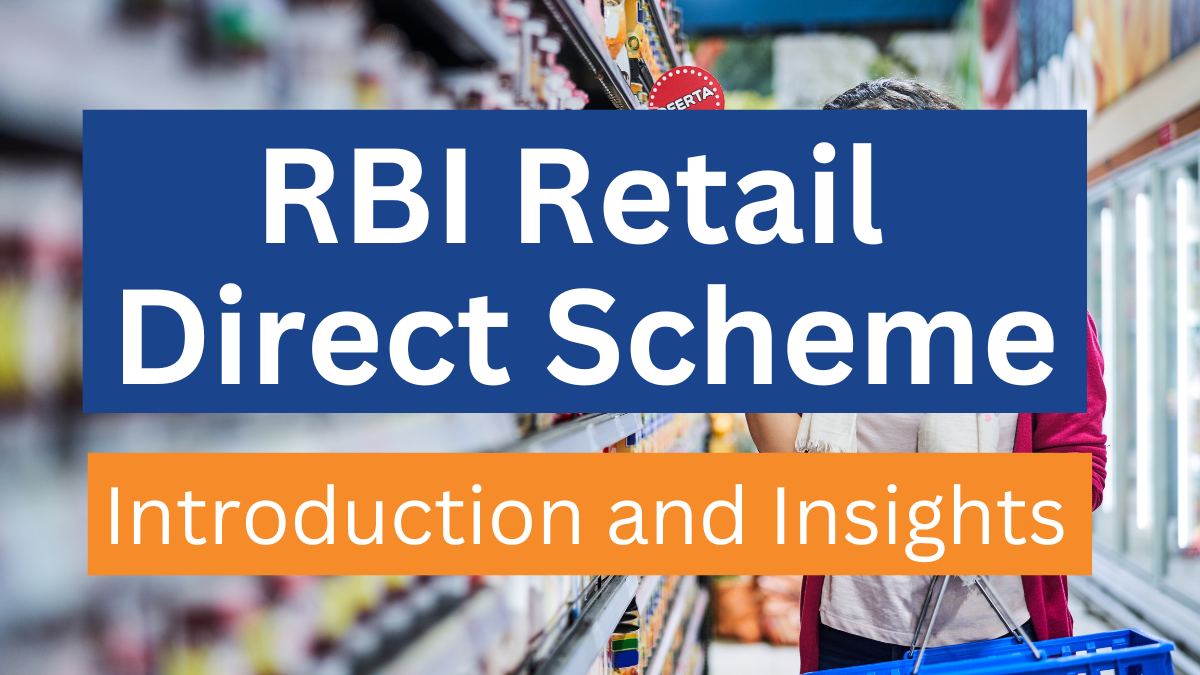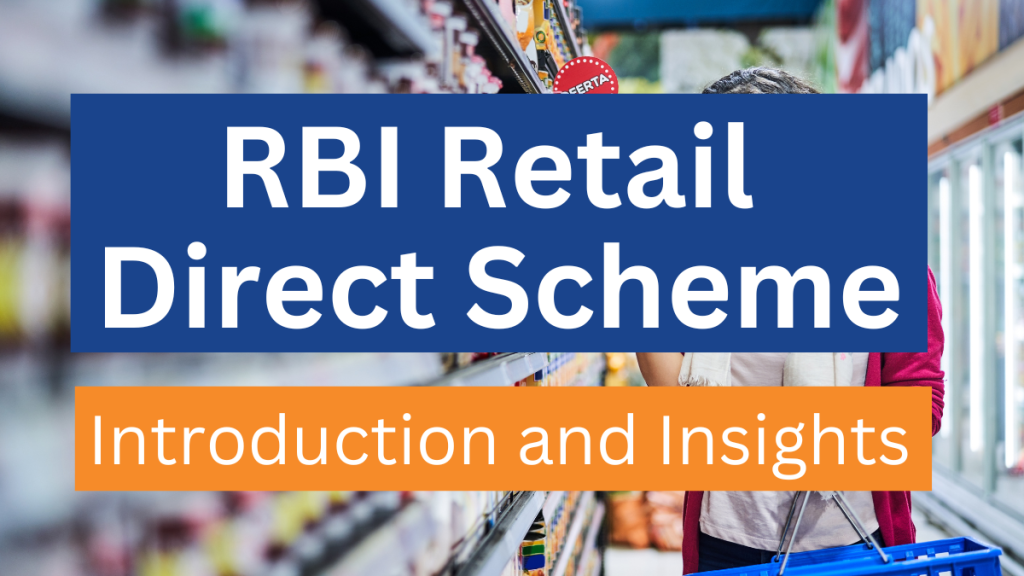To encourage the trade participation in the Government securities, the RBI Direct retail Scheme was launched on November 12 , 2021. This is to facilitate the transparency that users often miss while subscribing to Government securities through any broker companies. Therefore, this scheme was launched to ensure the adherence of fair transactions in the purchasing of Government securities.
In this Blog, we are going to talk in detail about the RBI Direct Retail Scheme and how you can get befitted by it so I would recommend you read this blog till the end.

Let’s start by knowing what RBI Retail Direct Scheme is all about.
An introduction to the RBI Direct Retail Scheme
With the help of the RBI Direct Retail Scheme, users are now able to access the Government Securities market directly through both primary and secondary ways. All they have to do is create a G sec account (Gilt Securities Account) with the RBI. However, previously retail investors weren’t allowed to deal directly with RBI but now users can direct deal with RBI through the RBI Direct retail Scheme.
Why Transact through RBI Direct Retail Scheme?
The Government Securities investing has emerged has a safe investment option among users because of its leading support. Furthermore, it also boosts the portfolio performance apart from the inclusion of equities. So if you are someone looking to build your investment portfolio to speak volumes, then this RBI Direct retail Scheme is for you.
If we compare the return on investment through this scheme and the GOI bond then we can see that for the 3 years GOI Bond gives approx. 5.1 per cent of return, whereas the return of 3 years received through this scheme will give approximately 6.5 per cent of return. Hence, it is evident which gateway is beneficial for users to invest in Government Securities. However, the tenure under which a user can invest through this scheme is between 3 to 40 years based in the maturity of the bonds.
The Government bonds on which the user can invest through the RBI Retail Direct scheme are as follows:
- Government Treasury Bills
- Sovereign Bonds
- State Development Loans
- Govt of India Dates Securities
Risk Involved in Investing Through RBI Direct Retail Scheme
If we talk about the overall risk involved in the investment through this scheme, then it is minimal or negligible. The only risk here is the timing of investment, because the prices of bonds tend to fluctuate in the market depending on external or internal factors like inflation, war etc. Apart from that some macroeconomic factors are also involved in the price fluctuation of those bonds. However, users have to understand the fact that the pricing and market of small retail bunches might not be liquidated at their initial stage after investment. Therefore, if you expect to get a decent return of investment in Government Securities through this scheme, then patience is the key. The more time you stay in the market with your purchased bonds, the better probability there is for your bond to liquidity and provide a good return on investment.
Who is Eligible to Invest Through RBI Direct Retail Scheme?
If you are a permanent resident of India, then the basic and most important criteria to become eligible to invest through this scheme is that you must possess a Savings bank account in any Indian Authorized Bank, must hold a Permanent Account Number (PAN) Card, Aadhar Card/Passport/Driving License for KYC verification, Authentic Email id and a registered phone number. Once you are ensured of the availability of the documents mentioned, then you can head to the next proceedings. NRI or Non residents are eligible to invest in Government Securities as per the rules mentioned under Foreign Exchange Management Act, 1999.
How to open an RDG (Retail Direct Gilt) Account?
To begin with the process, you have to open an RDG (Retail Direct Gilt) Account. This account can be opened solely or jointly. The process to open the RDG Account is mentioned below:
Step 1: Visit the scheme portal at rbiretaildirect.org.in
Step 2: Click on Open RBI Retail Direct Account
Step 3: An investor Registration Form will pop up on the screen, fill all the required details there and click on submit.
Step 4: Verify your Phone number and Email if through OTP verification and enter the login name.
Step 5: Once this process is done, you will be redirected to click on the final Submit after previewing the complete details. Check and make sure you have filled all the details appropriately. Once you have submitted a ‘Tracking Number’ will be allotted to you.
Step 6: Now you will see a KYC verification option. Here you have to click on the ‘Initiate KYC’ option. In case of joint account, this KYC process is applicable to both the account holders. You will be required to upload your KYC documents of name, address, bank account, and others for authentication purpose.
Step 7: After the completion of the KYC process, click on the submit button. Your KYC and registration process ends with this step.
Taxability in the Government Securities Purchased Through the RBI Direct Retail Scheme
In the case of holding any Government Bond till Maturity, then the interest received on the return of investment is taxable as per the relevant tax slab. However, then there will be no capital gain tax in such investment returns. Furthermore, if the bond is converted and traded in the secondary market after purchasing but before reaching maturity, then the capital gains tax is applicable to the seller in accordance with the duration the bond was held.
In a nutshell, as per the taxability point of view, any Government security having a maturity period of more than a year is considered under the long-term capital gain and in such circumstances, the capital gain tax applicable would be 10 per cent of the interest received in investment. Furthermore, the long term capital gain tax on unlisted Government securities is 20 per cent and here indexation benefit cannot be claimed. However, taxation on the short term capital gain adheres to the regular slab rate.
How to Purchase Government Securities via RBI Direct Retail Scheme?
The RDG account holders are required to maintain a balance in that account prior to making any purchase orders. Furthermore, the auctions in the primary market are held every week. On the other hand, in the secondary market, auctions can be done 5 days a week from Monday to Friday from 10am to 3:30 PM IST. In the secondary market, the process can be done through NDS-OM, an anonymous electronic order matching system facility for trading in Government securities. The users can follow purchasing and selling both processes on the RBI direct scheme portal.
Now you must have understood the operations, purchase process and much more about the RBI Direct Retail Scheme. At ixamBee, we ensure to make you experience immense wisdom through various resources. From our study material to blogs, the flow of education never stops here.
Conclusion
The purpose of launching the scheme and establishing the RBI direct scheme portal is to provide retail users with a safe and secure environment to trade and invest in Government Securities. Eliminating the involvement of any third party brokers encourages investors to rely on and invest in Government securities without fear of being the victim of any trading misconduct. We hope that you have understood about this scheme and have no doubt about it. No matter if you are a potential investor or a knowledge gainer. Our purpose is to offer you insightful information about every aspect of the topic. You will always find us in your journey of gaining knowledge, we wish you all the best.
To help you prepare 50% faster for competitive exams, ixamBee provides a free Mock Test Series and all the Current Affairs in English and Current Affairs in Hindi in the BeePedia capsules for GA Preparation. You can also get the latest updates for Bank PO, Bank Clerk, SSC, RBI Grade B, NABARD, and Other Government Jobs.
